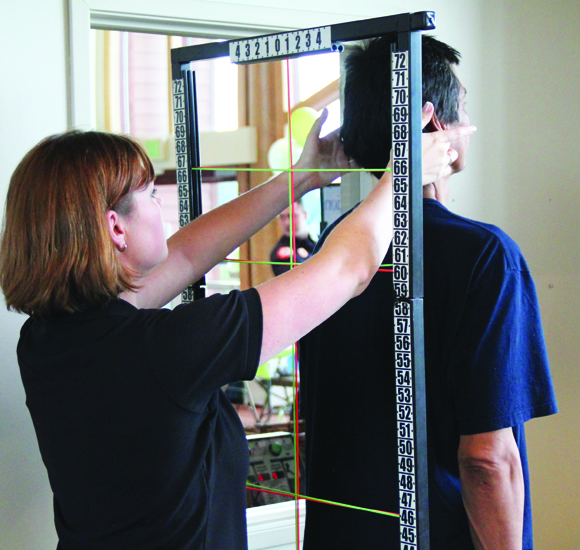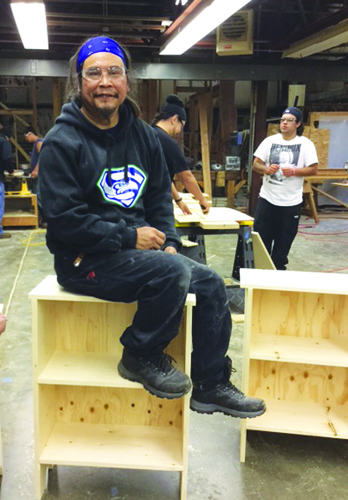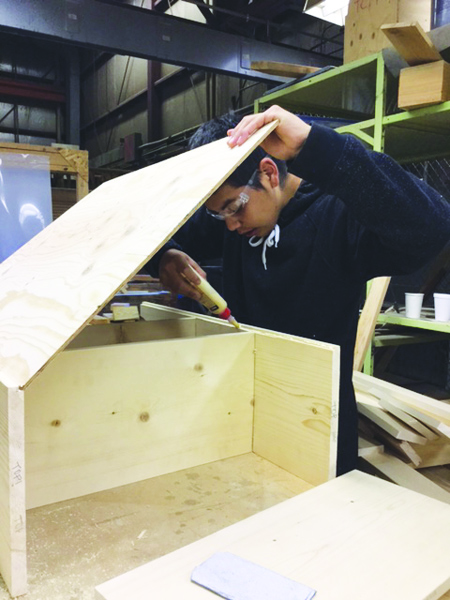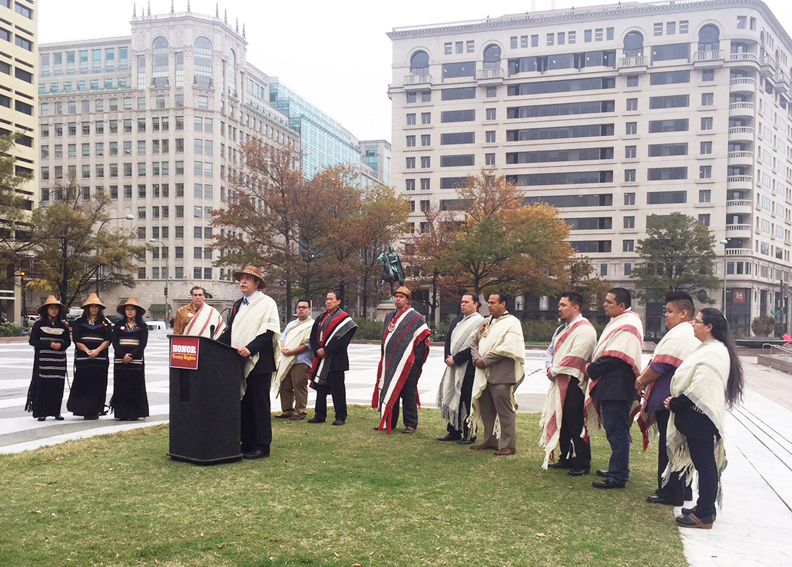Click on the link below to download the November 18, 2015 syəcəb
November 18, 2015 syəcəb
syəcəb
Please join us in honoring our Veterans at the Hibulb Cultural Center and Natural History Preserve, tomorrow November 11th. We will begin with the posting of colors at 11:00am in our longhouse room followed by workshops and presentations by our fellow Veterans. There will be a light lunch and refreshments. Please join us in showing our appreciation for those who have served or currently serving.
By Micheal Rios, Tulalip News
Early detection is key for the treatment of heart disease, diabetes, prostate cancer, and many other diseases that disproportionately affect men. However, men are less likely to seek preventative care than women. Despite growing awareness, men usually take a back seat approach to maintaining their health. We will shy away from seeking advice, delaying possible treatment and/or waiting until symptoms become so bad we have no other option but to seek medical attention. To make matters worse, we refuse to participate in the simple and harmless pursuit of undergoing annual screenings.
Enter the Annual Men’s Health Fair held at the Karen I. Fryberg Tulalip Health Clinic on October 6. This year’s health fair provided us men the opportunity to become more aware of our own health. With various health screenings being offered for the low, low price of FREE we were able to get in the driver’s seat and take charge of our own health. Cholesterol, prostate, screening, and oral cancer screenings were among the options for men to participate in. Along with all the preventative health benefits of participating in these screenings, as if that was not reason enough, they gave out prizes and a complimentary lunch to every man who showed up.
At 16.1 percent, Native Americans have the highest age-adjusted prevalence of diabetes among all U.S. racial and ethnic groups. Also, Native Americans are 2.2 times more likelyto have diabetes compared with non-Hispanic whites (per Diabetes.org). Clearly we are at a greater risk when it comes to diabetes, making it all more crucial to have glucose testing and diabetes screenings performed on an annual basis. For those men who attended the health fair, they were able to quickly have their glucose (blood sugar) tested with just a prick of the finger.
“The blood glucose test is a random check. Random is good, but doesn’t give you all the information which is why we do the A1C testing. It’s just nice to know if you are walking around with high blood sugar. This is a good way of saying ‘Hey, you need to go see your doctor.’ It’s not a definitive diagnosis,” said Nurse Anneliese Means of the blood sugar test.
Taking diabetes awareness one step further, an A1C test was available, by way of a blood draw that would also be used to test for high cholesterol.
“A1C is a diabetes screen. A1C is more of a long term indicator of glucose control as opposed to a regular blood glucose screening, which is here and now. A1C tells you what your blood glucose has been doing for the past 3 to 4 months,” states lab technician Brenda Norton.
How often should we have a diabetes screening performed? “Everyone should be checked once a year,” Norton said.
According to the Centers for Disease Control and Prevention (CDC), heart disease is the first and stroke the sixth leading cause of death among Native Americans. High blood pressure is a precursor to possible heart disease and stroke. High blood pressure is also very easily detected by having routine checks of your blood pressure taken periodically.

Representatives from Health First Chiropractic, the Marysville branch, were on hand as well to offer a free posture analysis. Using a spinal analysis machine, the patient advocate conducted postural exams on a number of men and reviewed the results with each participant. Good posture can help you exercise more safely and achieve better general health. When you sit or stand correctly, your organs will be better aligned, which reduces indigestion and helps your lungs to function at full capacity. Your core muscles will be strengthened and your back and shoulders will feel more comfortable.
Jeff O’Larey, Meat Field Specialist for Haggen, offered a presentation to about 20 men and a few members of the Tulalip Wisdom Warriors program. Topics ranged from appropriate portion sizes especially in regards to meat, discussing the benefits of free-range food sources, sodium and nitrate counts in processed foods, and general food safety concerns. After the presentation, each participant was given a few quality, choice cuts of beef to enjoy later.
Along with the various health screenings being offered there were information booths available that ranged from alternative health care options in the local area, ways to have cleaner air in your home, and methods to change eating habits as to live a heathier lifestyle. There was a booth where we could have our grip tested, a method used for assessing joint and muscle fatigue. Another booth offered us the opportunity to have our BMI (body mass index) and body fat percentage measured. Wondered if you need to cut back on those weekend treats? Or if you need to start leading a more active lifestyle? Well if that BMI was too high and you didn’t like what your body fat percentage was, now you know the answer.
Face it, as we get older, we all need to become more aware of the inevitable health concerns that may one day affect us. The possibility of having to deal with high cholesterol, high blood pressure, diabetes, or the possibility of prostate cancer looms over us all. The only way to avoid such health concerns to heighten our awareness of these preventable conditions. Health educators empower us to be more proactive about our health by getting annual screenings, detecting issues early, as well as seeking medical treatment before a simple, treatable issue becomes life altering.
To all of the men who attended the Men’s Health Fair, Jennie Fryberg, Health Information Manager, issued the following statement, “First, I want to thank the Tulalip Tribes for sponsoring our Tulalip Health Fairs this year. Prevention, prevention, prevention. Also, I want to thank all the men that came out today for the annual men’s health fair. Way to come and take care of your health. I hope you all enjoyed today’s fair.”
Contact Micheal Rios, mrios@tulaliptribes-nsn.gov

By Kim H. Newland, Tulalip News
It’s no surprise that education leads the list of actionable attributes that comprise the Tulalip TERO vision statement.
The savvy folks at TERO know that education, ranging from early learning to meaningful vocational training, can lead to greater opportunities for Tribal members of all ages.
TERO Director Teri Gobin, “Sha-Ha-La-Los,” believes that the newly renamed TERO Vocational Training Center will continue to grow and evolve, expanding well beyond what were the traditional native income sources earned from the “three Fs: fireworks, fishing and firewood.”
Under the TERO umbrella, the construction training program continues to thrive thanks to the generous and consistent support of the Charity Table administered through the Tulalip Foundation and ongoing funding through the Washington State Department of Transportation. Recent infrastructure changes include a dynamic $500,000 grant (over three years) from the W.K. Kellogg Foundation and a new affiliation with Renton Technical and South Seattle Community Colleges. TERO dollars, a Tri-County WorkSource grant and other grants also support enhanced learning and help provide diverse and stable funding sources for the program.
Both Gobin and TERO Client Services Coordinator Lynne Bansemer are quick to point to partnerships and strategic alliances with others as a major reason for the continued success of the program. Along with building personal relationships with the trades and labor unions they also praise the work of Susan Crane with SkillUp Foundation for her efforts to help secure the W.K. Kellogg Foundation and other supporting grants.
While the financial impact of the substantial Kellogg grant may seem obvious, the requirements for funding also serve to enhance the program and are closely aligned with the deployment of additional resources. Along with improved tracking of students after training, the grant will help fund a new family and career navigator and allow for broader exposure to trades and apprenticeship opportunities.
To help meet the Kellogg grant goal of multi-generational impact, the students constructed small bookcases which served as the inspiration for a collaborative activity during a family open house held Nov. 6. On Saturday, family members visited the classroom to share in the completion of the project by helping to paint and decorate the bookcases before taking them home.
Site Specialist Billy Burchett credits the staff at TERO for their work to help strengthen the program. He feels that taking a more “college-like” approach, beginning with the application and registration process, has resulted in a stronger commitment and higher level of engagement from the students.
While the ultimate goal is steady employment with a living wage, each student arrives at this moment from a different perspective.
Ivan Solomon is seeking a better life for his family. Helping to raise his niece and nephew, Solomon is confident that the knowledge he’s gaining will lead to steady hours and a consistent income. He’s really enjoying the chance to leave the classroom for field trips and understands that the chance to learn additional employability skills like CPR, forklift operation and flagging are helping him with his goal to “take his life back”.

Although he admits that his presence in class is the direct result of an insistent mother, Dante Jones is confident he’ll be able to walk out of this class and earn a starting wage of $20 an hour working as an apprentice in a variety of trades. Yet, he believes his earning potential is much higher, “I’m looking further than a $20 per hour job, and I know I can do it!” Jones confidently asserts.
Applications for winter quarter with classes starting February 1 are available through the TERO office. Contact Lynne Bansemer at 360-716-4746 for further information.

BY GRACE TOOHEY, Bellingham Herald
WASHINGTON – A proposed coal terminal and affiliated railway for Cherry Point, Wash., has sparked concern about treaty violations and environmental degradation for many Pacific Northwest tribal leaders, 10 of whom rallied together in Washington, D.C., on Thursday morning against what they said is government disregard for their treaties.
About a block from the White House, three Lummi Nation sisters crooned a song referencing the 1855 U.S. treaty with Pacific Northwest Native American tribes, reserving certain rights for their fishing, hunting and sacred grounds. “What about those promises? Fills my heart with sadness, I can’t do this on my own, we’ve got to come together and be strong,” the women sang.
But Tim Ballew II, chairman of the Lummi Nation, said those rights are in jeopardy.
“All the tribes are standing here today in solidarity to protect not just our reservation community but everybody’s community from the impacts that cannot be mitigated,” Ballew said, standing in front of leaders from the Tulalip, Swinomish, Quinault, Lower Elwha Klallam, Yakama, Hoopa Valley, Nooksack and Spokane nations and the president of United South and Eastern Tribes.
The proposed Gateway Pacific Terminal, a subsidy of SSA Marine, would act as a trading hub between landlocked domestic companies and markets in Asia, said Joe Ritzman, vice president of business development for SSA Marine. The deepwater terminal would handle up to 60 million tons of commodities, primarily coal, and the project would coincide with a railway expansion.
OUR CURRENT FOCUS IS THE IMPACT ON TREATY FISHING RIGHTS, AND IT’S THE GOVERNMENT’S RESPONSIBILITY TO UPHOLD THE TREATY. Tim Balew II, chairman of the Lummi Nation
But the project’s designated land includes burial sites for Lummi ancestors and artifacts, Ballew said, and the coastal development would harm age-old fishing traditions within the tribe.
“The location of the pier will take away fishing grounds and the increase in vessel traffic would impede access of our fishermen to fishing grounds throughout our usual and accustomed areas,” Ballew said.
Washington state, Whatcom County and the federal government are reviewing the environmental impacts of the proposed export terminal and associated rail expansion, expecting to release state-local and federal environmental impact statements in 2017. The U.S. Army Corps of Engineers, which is the federal review agency, is also inspecting Native American treaty rights at play.
“Our current focus is the impact on treaty fishing rights, and it’s the government’s responsibility to uphold the treaty,” Ballew said.
The Lummi Tribe, whose reservation is minutes from Cherry Point, entered the Treaty of Point Elliot more than 150 years ago, which ensured the sovereign nation right to “fish at usual and accustomed grounds and stations is further secured to said Indians in common with all citizens of the Territory.”
JoDe Goudy, chairman of the Yakama Nation, said his tribe has faced similar treaty battles in Oregon, most recently when the governor halted a proposed coal export plant near their sacred ground and Columbia River fisheries. But now that decision is under appeal, putting their treaty rights at stake again, Goudy said.
“The recognition from us collectively (is) that those reserved rights go hand in hand with our sustained existence as peoples,” Goudy said. “A direct attack on such things, in our hearts and minds, is a direct attack on our sustained existence.”
Not only would the Gateway Pacific Terminal affect the Lummi Nation, Goudy explained, but the proposed railways would transport coal by the Yakama Nation’s portion of the Columbia River.
“This issue affects all of us, we’re connected in ways that the U.S cannot even imagine,” said Tyson Johnson, council member of Nooksack Indian Tribe.
SSA Marine will wait until the state, county and federal environmental reports come out, Ritzman said. But with plans for mitigation strategies and a 75 percent natural buffer of the 1,500 acres for the project, Ritzman said he expects his company’s proposal to meet all state and federal environmental requirements and not impact the fisheries.
President Barack Obama and his administration met with the tribal leaders and many more Thursday afternoon as a part of the White House Tribal Nations Conference.
“I credit the current administration for every year building on our efforts to help us rebuild our nations and I encourage them to continue that,” Ballew said. “We really want them to give this issue its due respect. It’s a human rights issue, it’s a treaty rights issue, and we need our sacred sites protected.”
Jeanne Steffener, Tulalip Tribes Higher ED
The study of politics is both humanistic and scientific and it is centuries old. Aristotle called it the “queen of the sciences”. The American Constitution reveals a coming together of political theory with the practical creation of political institutions and practices. Today’s political research consists of highly scientific and demanding attempts to understand human behavior and world events. The study of politics prepares you for not only employment but for life as an informed citizen ready to join in political activities within interest groups or political parties related to community organization and political advocacy. You might even one day service as an elected or appointed official.
A major in political science offers a solid undergraduate education in the liberal arts and sciences. This course of study prepares the graduate for a variety of careers by stressing the acquisition of skills in communication and critical analysis; encouraging independent thought, tolerance, and informed interest in current affairs. The ability to define a problem and contribute to its solution is highly valued in a number of employment scenarios, as are skills in writing, research, and evaluation. These are elements that characterize a liberal arts education. Graduates today can expect to change jobs a number of times and even possibly change careers which makes political science an excellent preparation for the flexibility required in today’s employment market. The study of political science provides a background for careers in government at the local, state and national levels; international organizations; political campaigns; interest groups and lobbying organizations; journalism; business and law.
The federal government is our country’s largest employer. They employ a large diverse number of employees making use of their skills, abilities & levels of responsibility. Advancement can be gained with excellent job security, pay and benefits. Specific job skills are not what hiring agencies are looking for. They look for people who can learn quickly, work as part of a team and have basic understanding of the policy process and the operations of a national government. What is valuable for students intending to work for the federal government is course work on the executive branch, Congress, the courts, policy process, activities of interest groups and political parties and the role media plays.
Local and state governments provide services in nearly every area of our lives. Courses on state and urban government, public policy, and public administration would be very valuable. Skills acquired in a statistics course and the experience of an internship is really relevant for jobs at the local and state level.
International businesses and organizations offer a variety of careers for those who have an understanding of the political and regulatory environment which effect businesses. Some of the courses that provide knowledge in these areas are: comparative politics, international relations and organizations, public policy, political development, and interest group politics. Electives or minors in these areas are extremely helpful: basic economics, statistics, computer science and international trade.
Lawyers are employed by corporations, governments, organizations and going into private practice. Admission to law school is largely based on undergraduate grade point average and LSAT exam scores. Content of courses at law schools prepare future attorneys’ for the different areas of law that they will eventually practice. The practicing of law requires the honed skills of critical analysis, effective writing and communication, and knowledge of subject matter related to the law and legal processes.
Top-notch communication skills are required for journalists, as well as a bachelor’s degree. Regardless of the type of media you are interested in, a broad based liberal arts background is a must. A liberal arts education which contributes to your understanding of society and individuals is vital. Course work in the fields of political science, history, economics and sociology are highly valued. A basic understanding of the American political system is essential, while participating on a school newspaper or campus broadcasting station would be an extremely relevant experience.
Even if you are unsure about your career plans, studying Political Science can be a great avenue to pursue. Employers look for the critical thinking and communication skills that political scientists have acquired along with the knowledge about government and international politics. Please call Higher ED staff at 360-716-4888 or email us at highered@tulaliptribes-nsn.gov for assistance on this educational path.
Leaders and members of the Lummi Nation and other Washington State tribes opposed to coal terminals in the Pacific Northwest are bringing their concerns to the other Washington, the U.S. capital, on Thursday November 5.
Eight tribes in total will call on Congress to honor treaties that safeguard both the environment and tribal members’ ability to fish and conduct other cultural and sustenance activities that would be compromised by proposed industrial development. They plan to speak on the issue at the Ronald Reagan Building courtyard during the White House Tribal Nations Summit, to be held
“Tribal treaty rights are being threatened by corporate interests and congressional interference,” said the tribes in a media release announcing the event. “As Lummi Nation fights to protect its fishing areas from North America’s largest coal terminal, other tribes have faced their own development pressures and stand united with Lummi against the terminal and the erosion of treaty rights.”
The Lummi have vociferously opposed the projects and have asked the U.S. Army Corps of Engineers to review and reject the proposal for a coal rail terminal at Cherry Point, the ancestral village site of Xwe’chi’eXen.
RELATED: Lummi Nation Asks Army Corps to Deny Permit for Coal Export Terminal
The statement is signed by Lummi Nation Chair Tim Ballew II; Swinomish Indian Tribal Community Chair Brian Cladoosby (also president of the National Congress of American Indians, a post to which he was recently reelected); Lower Elwha Klallam Tribe Chair Frances Charles; Tulalip Nation Chair Melvin Sheldon Jr.; Yakima Nation Chair JoDe Goudy; Hoopa Valley Tribe Chair Ryan Jackson; Spokane Tribe Chair David Brown Eagle, and Quinault Tribe Vice President Tyson Johnston.
RELATED: Lummi Chairman: We Will Fight Coal Terminal ‘By All Means Necessary’
“Senator Steve Daines (R-MT) has led efforts in Congress to prevent the U.S. Army Corps from reviewing the impact of the terminal on the Lummi Nation’s treaty fishing rights—a central tenet of its trust responsibility,” the leaders said in the statement. “If successful, it could set a dangerous precedent for other projects in Indian country.”
Read more at http://indiancountrytodaymedianetwork.com/2015/11/03/eight-tribes-protest-coal-terminals-during-dc-conference-162304